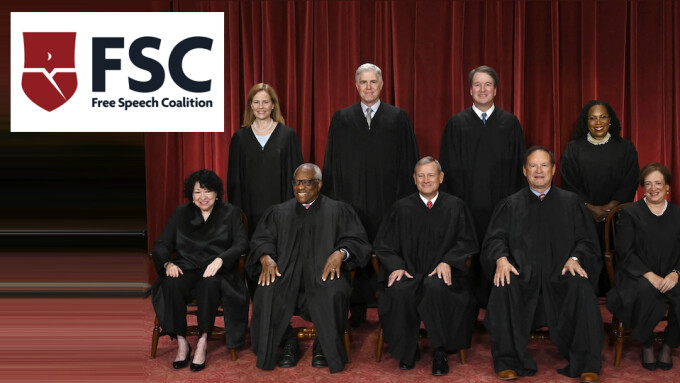WASHINGTON — Free Speech Coalition (FSC) filed a petition for certiorari on Friday asking the U.S. Supreme Court to overturn the Fifth Circuit panel decision that partially upheld Texas’ controversial age verification law.
FSC released the following statement about the petition:
Represented by the American Civil Liberties Union and the law firm Quinn Emanuel Urquhart & Sullivan, the Free Speech Coalition and others today asked the U.S. Supreme Court to overturn a lower court ruling that, if left standing, would improperly burden free speech online. The petition for certiorari was filed in Free Speech Coalition v. Paxton, which challenges an unconstitutional age-verification provision in Texas’s H.B. 1181.
“Though it purportedly seeks to limit minors’ access to online sexual content, the law in fact imposes significant burdens on adults’ access to constitutionally-protected expression, requiring them to provide personal identifying information online to access sensitive, intimate content” said Vera Eidelman, staff attorney with the ACLU Speech, Privacy and Technology Project. “This isn’t the first time that concerns about minors’ access have led legislators to pass unconstitutional laws. We’ve gone through this time and again, with everything from drive-in movies to video games to websites, and courts have repeatedly struck down laws imposing requirements that burden adults’ access to non-obscene sexual content in the name of protecting children.”
HB 1181 requires certain sites with sexual content to force their visitors to provide digital IDs or other proof of age before they can access the published material. Sites that do not comply could face up to $3 million in fines. This provision claims to protect minors from accessing sexual content deemed harmful to them, but it does not merely restrict minors’ access. It also restricts adults’ access to this content, effectively requiring them to identify themselves online. Requiring individuals to verify their ages before accessing this protected speech robs people of anonymity, and threatens to bar individuals—for example, those who lack government identification or whose age is mis-identified by the relevant technology—from accessing certain websites altogether. The ACLU and its partners argue that the law places an impermissible burden on the exercise of adults’ First Amendment rights online.
“Despite proponent’s claims, age-verification online is simply not the same as flashing an ID at a check-out counter. The process is invasive and burdensome, with significant privacy risks for adult consumers,” said Alison Boden, executive director of the Free Speech Coalition. “In states where these laws have passed, the vast majority of users have refused to comply, leading to a massive chilling effect on their legal right to access constitutionally protected speech. Adult sites are the canary in the coal mine of free speech, and we look forward to defending the rights of all Americans to access the internet free from surveillance.”
Before the case reached the Supreme Court, a district court briefly blocked the law from being enforced, stating that, as written, the law’s age-verification provision would unconstitutionally chill the speech of adults. However, a divided Fifth Circuit panel recently vacated that injunction, reasoning that the age-verification provisions’ burden on adults’ First Amendment rights merely has to have some rational basis–not face strict scrutiny–because the aim is to protect children. Unless the Supreme Court intervenes, this decision will effectively reverse decades of precedent protecting the free speech rights of adults.
In prior cases brought by the ACLU, the Supreme Court has repeatedly recognized the crucial role anonymity can play online and held that requiring users to verify their age to access protected content is unconstitutional where there are less restrictive alternatives available, like filtering software. In Reno v. ACLU, the Supreme Court unanimously ruled that anti-indecency provisions of the 1996 Communications Decency Act, also meant to protect children, violated the First Amendment's guarantee of freedom of speech in part because of the burden it imposed on adults. In Ashcroft v. ACLU, the Court held that a law almost identical to the Texas law had to satisfy strict scrutiny because it restricted adults’ access to protected sexual speech. Where a less-restrictive alternative exists—for example, the installation of filtering software on minors’ devices, which states can encourage or legislate—the government cannot impose age verification on adults in the name of protecting children.
Free Speech Coalition v. Paxton is one of several cases in which the ACLU has urged courts to reject age-verification schemes that would burden the free speech rights of Internet users as part of the organization’s long tradition of defending online free expression. This petition was filed jointly by the ACLU and the law firm Quinn Emanuel Urquhart & Sullivan on behalf of Free Speech Coalition, Inc., et al.
To read the filing, click here.








